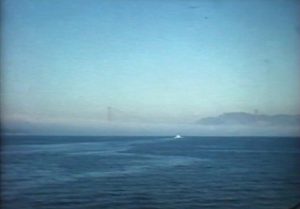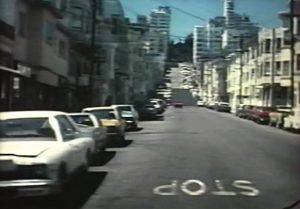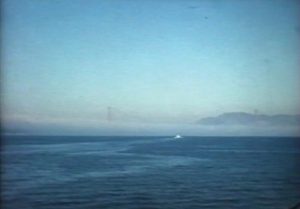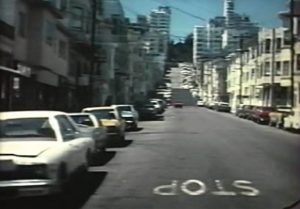Breakfast with Jeunesse perdue
Interview with François Zabaleta, director of Jeunesse perdue [Lost Youth]
This nine-minute documentary is both introspective and retrospective, looking back at a trip you took to San Francisco in your youth. What sparked your desire to put this memory into images, to give it a cinematic destiny?
Jeunesse perdue is a small (autobiographical) part of a monologue (mainly a work of fiction) that I wrote for the theater and turned into a feature film, Chien perdu [Lost Dog], this summer. I felt like this very young man’s story, this young kid who dreams of America and films, who crosses the earth to become the filmmaker he’s always wanted to be, even though he has no money, his English is pretty poor and he knows no one in California, I felt his story was interesting because it was reflective of a number of people from my generation who made the same journey for the same reasons in the 1970s. For me, San Francisco definitely had ghosts of Vertigo. At the same time, for the last few years, I’ve been working on a short form for documentaries, which are like snapshots of film that I call haikus. This is how I described the origins to Jean-Pierre Carrier, the historian of documentary cinema and author of the blog DICOBLOG:
“I’d never imagined writing or making documentary films. I had the simplistic idea that documentaries necessarily, by their very nature, dealt with political or societal issues. I very quickly learned however that that was not the case. In making my first film, I realized that private things, intimacy, my raw material, could also in its own way be political. Documentaries also allowed me to tell stories and explore forms. That was the spirit in which I wanted to try to make very short documentary films, which I called cinematic haikus. The documentary genre requires time and for this reason is rarely associated with short films. The success of my five-minute film Fuck l’amour (which won an award at Clermont-Ferrand) made me start thinking. Then I began glimpsing the possibility of making documentary films that lasted fewer than ten minutes where I would present a situation, an awakening, a moment when life suddenly turns upside down, irreversibly. That’s what I meant by cinematic haiku: capturing the essence of a being or a situation stripped of everything that surrounds it so that the briefness, far from being an exercise in style, confers density to the (societal, etc.) world off-camera. Existing in a way in its own absence. As Roland Barthes so aptly said in Empire of Signs*: “In the haiku, the limitation of language is the object of a concern which is inconceivable to us, for it is not a question of being concise (i.e., shortening the signifier without diminishing the density of the signified) but on the contrary of acting on the very root of meaning, so that this meaning will not melt, run, internalize, become implicit, disconnect, divagate into the infinity of metaphors, into the spheres of the symbol. The brevity of the haiku is not formal; the haiku is not a rich thought reduced to a brief form, but a brief event which immediately finds its proper form.”
*Roland Barthes, Empire of Signs, trans. Richard Howard (New York: Farrar, Straus and Giroux, 1982). What also interested me is that the film tells the story of a failure that turns into a young man’s melancholy urban drifting, when he abandons his dreams and becomes a sort of ghost, surrounded by other ghosts who seem to be lying in wait for him – the AIDS virus and the Zodiac Killer.
How did you come up with the title ?
While editing the film, I was rereading several of Patrick Modiano’s novels, including In the Café of Lost Youth, and that’s when it clicked. Jeunesse perdue was ideal for this quest for self-discovery where the main character gets lost, loses track of himself, becomes his own shadow, becomes a real Modiano character.
You have a lengthy career as a writer and filmmaker of both shorts and feature films. Where does Jeunesse perdue fit into your filmography?
It has a special place. For a long time I hesitated about making this film because I was afraid it would be too personal, too anecdotal, that the audience wouldn’t connect with it… And then I carried on and made the film all the same. It’s dear to me because everything in it is true, the images are my genuine, banal and poignant images from a San Francisco that no longer exists. I’m not hiding behind anything. I didn’t spruce anything up; nothing is caricatured. I tell things exactly as I lived through them. And forty years later, I found a young man exactly as he was, with a teenager’s pimply face, trying to shine his little light, trying to give his passage on earth a little meaning.
You’re a regular at short film festivals and in fact won a jury special mention for Fuck l’amour in 2016 at the Clermont-Ferrand Festival. How have short film festivals influenced the trajectory of your films and your career as a filmmaker?
Very considerably. These festivals have helped me to find an audience (sometimes a family) that’s given me the courage or the madness to continue making films. I make films so they can be seen. I make films for others. And only for others. For all others. And film festivals who put their trust in me bring me numerous audiences that I could not have reached without them.
What are your hopes for Jeunesse perdue?
That it gives people confidence, to the young and not-so-young. That it gives them the courage or the madness to dare to take their own dreams literally. That it spurs audiences to take risks. Because we all know that the only way to get through life completely safely is, of course, by taking risks, by never ceasing to take them, by taking them up to your last breath, up to your death. People who think that protecting themselves, doing nothing, waiting for things to happen, blaming those who don’t share their non-choice in life, is a guarantee of a tranquil life, are mistaken. They’re the living-dead. The only way to live, truly, intensely, is to throw out your certainties, head into the wild and go out singing at the top of your lungs.
What do you think the future holds for short films?
A splendid future. Exciting. Today, short films are no longer a sort of necessary rite of passage towards feature films. A sort of unfinished, bastard form for novice filmmakers who are trying to make a name for themselves. It’s a fully legitimate format. A number of notable filmmakers continue to make short and medium-length films alongside their feature films. Contrary to what many people think, making a short film is no simple thing. It’s actually quite difficult to whisk your viewer off in only a handful of minutes. For me, it’s pure poetry. And you can’t just manufacture gracefulness. It’s like an angel’s wing that decides whether or not to land on your shoulder. And as everyone knows, it’s impossible to corrupt an angel.
If we were to go back into lockdown, what cultural or artistic delights would you recommend to alleviate our boredom?
This list is personal and not by any means exhaustive. Marguerite Duras’ India Song has been sublimely remastered. Everything you can find by the Filipino filmmaker Lav Diaz, whose most recent film, The Woman Who Left is an unforgettable masterpiece. A life-changing film. Everything by Antonioni, Akerman, Apichatpong Weerasethakul, Wang Bing, Jean-Daniel Pollet, Fassbinder, Syberberg, Werner Schroeter, Jean-Pierre Melville, Robert Bresson, Paul Vecchiali, Godard, Jean-Claude Brisseau, Jacques Demy, Alain Resnais, Rohmer, Ozu, Tarkovski, Naruse, Chris Marker, Wiseman, Alain Cavalier, Douglas Sirk, Cassavetes, Kieslowski, Nuri Bilge Ceylan, Lynch, Malick, Kiarostami. And endlessly watching anything you can find by the tremendous Pina Bausch…
Jeunesse perdue is being screened as part of National Competition F1.












